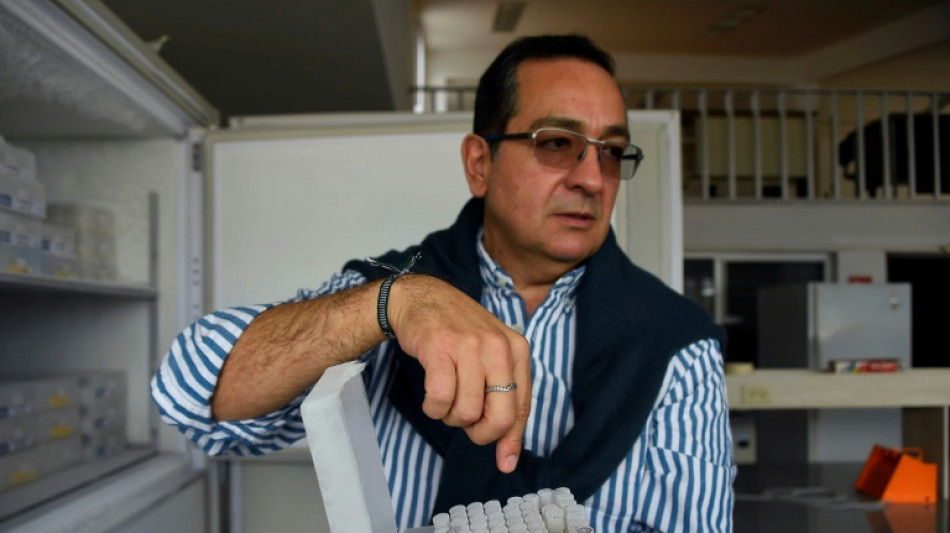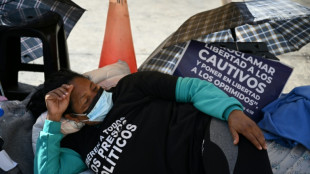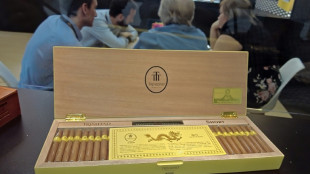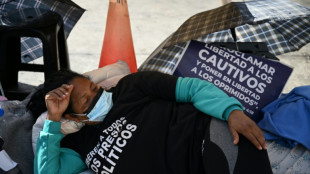
-
 Team USA men see off dogged Denmark in Olympic ice hockey
Team USA men see off dogged Denmark in Olympic ice hockey
-
'US-versus-World' All-Star Game divides NBA players

-
 Top seed Fritz beats Cilic to reach ATP Dallas Open final
Top seed Fritz beats Cilic to reach ATP Dallas Open final
-
China's freeski star Gu recovers from crash to soar into Olympic big air final

-
 Braathen wins unique Winter Olympic gold for Brazil, Gu overcomes scare
Braathen wins unique Winter Olympic gold for Brazil, Gu overcomes scare
-
Lens run riot to reclaim top spot in Ligue 1, Marseille slip up

-
 Last-gasp Zielinski effort keeps Inter at Serie A summit
Last-gasp Zielinski effort keeps Inter at Serie A summit
-
Vinicius bags brace as Real Madrid take Liga lead, end Sociedad run

-
 Liverpool beat Brighton, Man City oust Beckham's Salford from FA Cup
Liverpool beat Brighton, Man City oust Beckham's Salford from FA Cup
-
International crew arrives at space station

-
 Australia celebrate best-ever Winter Olympics after Anthony wins dual moguls
Australia celebrate best-ever Winter Olympics after Anthony wins dual moguls
-
Townsend becomes a fan again as Scotland stun England in Six Nations

-
 France's Macron urges calm after right-wing youth fatally beaten
France's Macron urges calm after right-wing youth fatally beaten
-
China's freeski star Gu recovers from crash to reach Olympic big air final

-
 Charli XCX 'honoured' to be at 'political' Berlin Film Festival
Charli XCX 'honoured' to be at 'political' Berlin Film Festival
-
Relatives of Venezuela political prisoners begin hunger strike

-
 Trump's 'desire' to own Greenland persists: Danish PM
Trump's 'desire' to own Greenland persists: Danish PM
-
European debate over nuclear weapons gains pace

-
 Newcastle oust 10-man Villa from FA Cup, Man City beat Beckham's Salford
Newcastle oust 10-man Villa from FA Cup, Man City beat Beckham's Salford
-
Auger-Aliassime swats aside Bublik to power into Rotterdam final

-
 French prosecutors announce special team for Epstein files
French prosecutors announce special team for Epstein files
-
Tuipulotu 'beyond proud' as Scotland stun England

-
 Jones strikes twice as Scotland end England's unbeaten run in style
Jones strikes twice as Scotland end England's unbeaten run in style
-
American Stolz wins second Olympic gold in speed skating

-
 Marseille start life after De Zerbi with Strasbourg draw
Marseille start life after De Zerbi with Strasbourg draw
-
ECB to extend euro backstop to boost currency's global role

-
 Canada warned after 'F-bomb' Olympics curling exchange with Sweden
Canada warned after 'F-bomb' Olympics curling exchange with Sweden
-
Ultra-wealthy behaving badly in surreal Berlin premiere

-
 250,000 at rally in Germany demand 'game over' for Iran's leaders
250,000 at rally in Germany demand 'game over' for Iran's leaders
-
UK to deploy aircraft carrier group to Arctic this year: PM

-
 Zelensky labels Putin a 'slave to war'
Zelensky labels Putin a 'slave to war'
-
Resurgent Muchova beats Mboko in Qatar final to end title drought

-
 Russia's Navalny poisoned with dart frog toxin: European states
Russia's Navalny poisoned with dart frog toxin: European states
-
Farrell hails Ireland's 'unbelievable character' in edgy Six Nations win

-
 Markram, Jansen lead South Africa to brink of T20 Super Eights
Markram, Jansen lead South Africa to brink of T20 Super Eights
-
Guehi scores first Man City goal to kill off Salford, Burnley stunned in FA Cup

-
 Swiss say Oman to host US-Iran talks in Geneva next week
Swiss say Oman to host US-Iran talks in Geneva next week
-
Kane brace helps Bayern widen gap atop Bundesliga

-
 Ireland hold their nerve to beat gallant Italy in Six Nations thriller
Ireland hold their nerve to beat gallant Italy in Six Nations thriller
-
European states say Navalny poisoned with dart frog toxin in Russian prison

-
 Braathen hails 'drastic' changes after Olympic gold
Braathen hails 'drastic' changes after Olympic gold
-
De Minaur eases past inconsistent Humbert into Rotterdam final

-
 Eurovision 70th anniversary live tour postponed
Eurovision 70th anniversary live tour postponed
-
Cuba cancels cigar festival amid economic crisis

-
 Son of Iran's last shah urges US action as supporters rally in Munich
Son of Iran's last shah urges US action as supporters rally in Munich
-
Jansen helps South Africa limit New Zealand to 175-7

-
 Braathen wins unique Winter Olympic gold for Brazil, Malinin seeks answers
Braathen wins unique Winter Olympic gold for Brazil, Malinin seeks answers
-
Relatives of Venezuela political prisoners begin hunger strike after 17 freed

-
 Ten-man West Ham survive Burton battle to reach FA Cup fifth round
Ten-man West Ham survive Burton battle to reach FA Cup fifth round
-
International crew set to dock at space station


400-year-old Ecuadoran beer resurrected from yeast
Inside an old oak barrel, Ecuadoran bioengineer Javier Carvajal found the fungus of fortune: a 400-year-old yeast specimen that he has since managed to resurrect and use to reproduce what is believed to be Latin America's oldest beer.
That single-cell microorganism, taken from just a splinter of wood, was the key to recovering the formula for an elixir first brewed in Quito in 1566 by friar Jodoco Ricke, a Franciscan of Flemish origin who historians believe introduced wheat and barley to what is now the Ecuadoran capital.
"Not only have we recovered a biological treasure but also the 400-year-old work of silent domestication of a yeast that probably came from a chicha and that had been collected from the local environment," Carvajal told AFP.
Chicha is a fermented corn drink brewed by the Indigenous people of the Americas before Spanish colonization.
Carvajal, who already had experience recovering other yeasts, found out about the ancient Franciscan brewery in Quito while reading specialist beer magazines.
It took him a year to do so, but he finally managed to find a barrel from the old brewery in 2008.
It was stored in Quito's San Francisco Convent, an imposing three-hectare complex built between 1537 and 1680, which is now a museum.
After extracting a splinter, Carvajal used a microscope to find a tiny yeast specimen, which after a long period of cultivation he was able to resurrect.
In his laboratory at the Catholic University of Ecuador, Carvajal takes a small vial containing a variety of the Saccharomyces cerevisiaerescatada yeast.
"It lives here in a little container. It's very humble, but it is the star" of the laboratory, said the 59-year-old.
- Filling the holes -
Carvajal, who comes from a brewing family, found an article in an industry magazine that vaguely described the formula for the Franciscans' 16th century drink.
Little by little, he pieced together bits of information to revive the brew with cinnamon, fig, clove and sugarcane flavors.
"There were a massive number of holes in the recipe and my job was to fill those holes," said Carvajal.
"It is a work of beer archeology within the microbial archeology" he had to carry out to rescue the yeast, which generates the majority of the drink's flavor.
After a decade of investigation and testing, Carvajal in 2018 began producing the beer at his home -- but the pandemic frustrated his attempts to commercialize it.
He still has not come up with a launch date for his product, nor a price.
Carvajal compares his work, centuries after the Franciscans domesticated the yeast, to intensive care on a molecular scale.
"It is as if they were dormant, like dried seeds but having deteriorated over the years. So you have to reconstruct them, fluidize them, hydrate them and see if their vital signs return."
Historian Javier Gomezjurado, who wrote a book on Quito beverages, told AFP that the brewery in the San Francisco Convent was the first brewery in hispanic America.
It began operations in 1566, but there were just eight friars in the convent at that time and production was minimal, said Gomezjurado.
With the introduction of machinery into the brewing industry, ancient formulas began to disappear. The brewery closed in 1970.
For Carvajal, resurrecting the yeast and the age-old methods used to make the ancient recipe was simply a labor of love for "the value of the intangible."
N.AbuHussein--SF-PST

